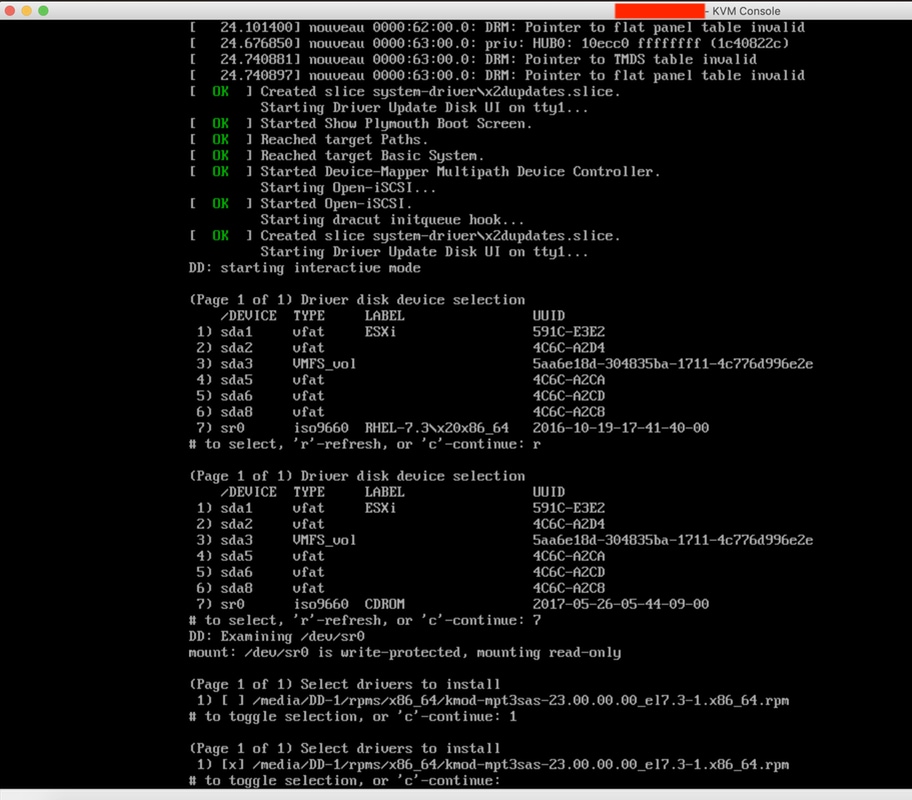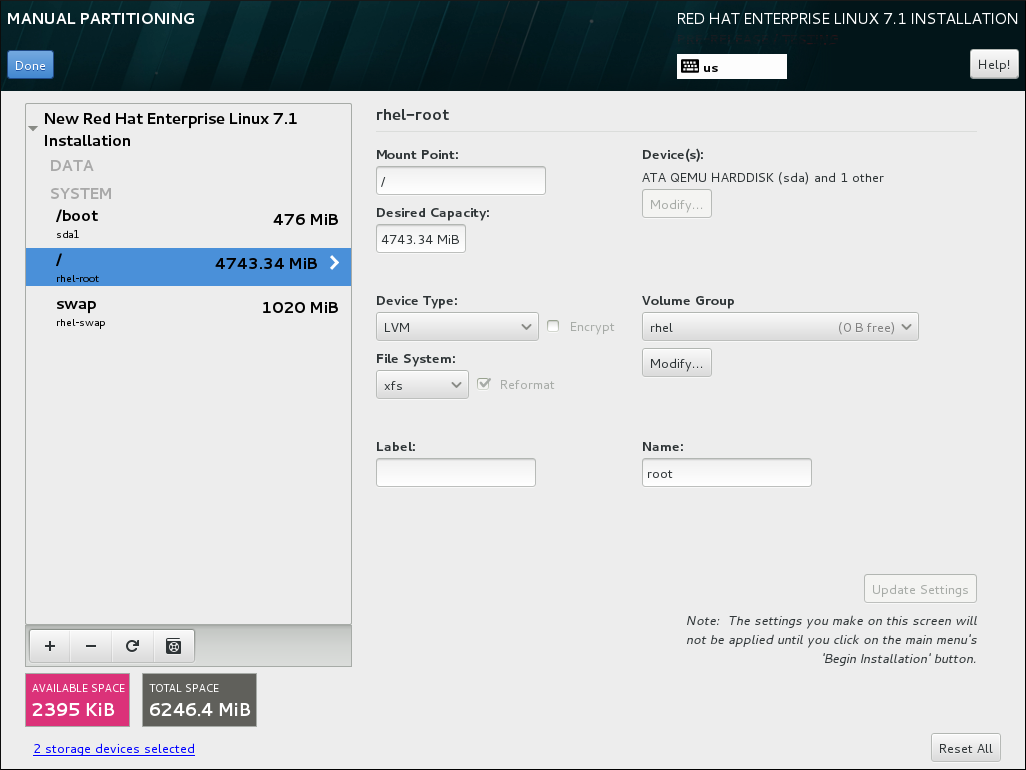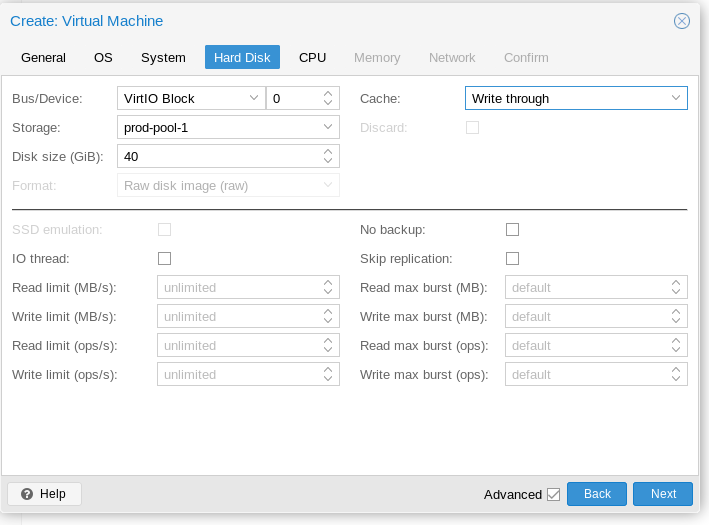Identify which logical unit numbers (LUNs) are seen using the cat/proc/scsi/scsi command.
The sg3utils package provides the rescan-scsi-bus.sh script, which can automatically update the logical unit configuration of the host as needed (after a device has been added to the system). The rescan-scsi-bus.sh script can also perform an issuelip on supported devices. Add the new device to /proc//scsi/scsi. For each additional logical unit number (LUN) that needs to be discovered by the Linux kernel, perform the following steps: At the command prompt type echo 'scsi-add-single-device H C I L ' /proc/scsi/scsi where H is the host adapter, C is the channel, I id the ID and L is the LUN and press the key.
Current versions of Linux may not scan the logical unit number (LUN) id of every device. This can result in PowerVault or Dell | EMC® devices not being identified or listed in the /proc/scsi/sci output.


To identify which logical unit numbers (LUNs) are seen using the cat/proc/scsi/scsi command, perform the following step:
- At the command prompt type cat/proc/scsi/scsi and press the <Enter> key.
The output will be similar to the following:
Attached devices:
Host: scsi0 Channel: 00 Id: 00 Lun: 00
Vendor: DELL Model: PERCRAID RAID5 Rev: V1.0
Type: Direct-Access ANSI SCSI revision: 02
Host: scsi1 Channel: 00 Id: 00 Lun: 00
Vendor: DELL Model: PV-132T-FC Rev: 4157
Type: Unknown ANSI SCSI revision: 03
Host: scsi1 Channel: 00 Id: 01 Lun: 00
Vendor: DGC Model: RAID 10 Rev: 0205
Type: Direct-Access ANSI SCSI revision: 04
Host: scsi1 Channel: 00 Id: 02 Lun: 00
Vendor: DGC Model: RAID 5 Rev: 0205
Type: Direct-Access ANSI SCSI revision: 04
Host: scsi1 Channel: 00 Id: 02 Lun: 01
Vendor: DGC Model: RAID 5 Rev: 0205
Type: Direct-Access ANSI SCSI revision: 04
Host: scsi1 Channel: 00 Id: 02 Lun: 02
Vendor: DGC Model: RAID 5 Rev: 0205
Type: Direct-Access ANSI SCSI revision: 04
Host: scsi1 Channel: 00 Id: 03 Lun: 00
Vendor: DGC Model: RAID 5 Rev: 0205
Type: Direct-Access ANSI SCSI revision: 04
Review the output of the /proc/scsi/scsi command to determine which devices are and are not being scanned.
Review the output of the /proc/scsi/scsi command to determine the host adapter, channel, target id and logical unit (LUN) of the devices that are scanned.
In the example below, the PowerVault 132T FC is shown at the address 1 0 0 0, which means host adapter 1, channel 0, ID 0, and LUN 0.
Host: scsi1 Channel: 00 Id: 00 Lun: 00
Vendor: DELL Model: PV-132T-FC Rev: 4157
Type: Unknown ANSI SCSI revision: 03
The remaining devices attached to the server, are those devices that were not scanned and identified by the operating system.


Determine the new logical unit number (LUN) id(s) of the remaining devices.
Determine the additional logical unit number (LUN) IDs that need to be configured for the SCSI device.
| NOTE: | Refer to the system documentation of the system with the SCSI devices, such as the PV 132T, to determine what the new LUN ID will be. |
Add the new device to /proc//scsi/scsi.
For each additional logical unit number (LUN) that needs to be discovered by the Linux kernel, perform the following steps:
- At the command prompt type echo 'scsi-add-single-device H C I L' >/proc/scsi/scsi where H is the host adapter, C is the channel, I id the ID and L is the LUN and press the <Enter> key.
- Repeat this step for additional devices.
The release of Red Hat Linux 5.2 builds on the momentum generated by the support of such key industry players as Intel and Netscape. Technology leaders like Oracle, Sybase, Informix, Computer Associates and Corel Computer Corporation also lend instant credibility to the Red Hat Linux Operating System.
Said Bob Young, President and CEO, Red Hat, Inc. ,'The ease-of-use features of Red Hat Linux 5.2 coincide with the incredible support by industry leaders of the Linux development model. Right now, our momentum is absolutely contingent on our ability to best advance the technology according to the demands of the industry. With Red Hat Linux 5.2, we are bringing to market an installation class that is the answer to enterprise-level demands.'
Redhat SCSI & RAID Devices Driver Download For Windows
A feature of Red Hat Linux 5.2's new and improved installation is the ability to automatically partition the hard drive by selecting either a workstation or server install. All of the power of the Red Hat Linux OS is still available via 'custom' install. Back buttons DHCP, boot floppy creation, enhanced rescue mode and countless other tools that made 5.1 a success are all still there.
In addition, Multiple SCSI support during install ease installation of systems with more than one SCSI adaptor. The Red Hat Linux 5.2 release also includes Apache 1.3, the world's most popular web server, and the long awaited GIMP 1.0 graphics package . When the Linux 2.2 kernel is ready, 5.2 is prepared for install. Updated PCMCIA support for some of the latest cards and better sound support mark this release as well.
Red Hat Linux 5.2 comes with 3 CDs, including the software application disk, and an Installation Manual. Red Hat, Inc. continues to support installation support up to 90 days. Red Hat Linux 5.2 can be purchased from Red Hat, Inc. for $49.95 or from local resellers worldwide.
Red Hat Scsi & Raid Devices Driver Download For Windows 7
RED HAT is a registered trademark of Red Hat, Inc. INTEL is a registered trademark of Intel Corporation. SPARC is a registered trademark of SPARC International, Inc. Products bearing the SPARC trademarks are based on an architecture developed by Sun Microsystems, Inc. ALPHA is a trademark of Digital Equipment Corporation. UNIX is a registered trademark of The Open Group. BRU 2000 is a trademark of Enhanced Software Technologies, Inc.
For more information about Red Hat, Inc. and Red Hat products and technologies, please call 1-919-547-0012.
About Red Hat, Inc.
Red Hat, the world's leading open source and Linux provider, is headquartered in Raleigh, NC with satellite offices spanning the globe. Red Hat is leading Linux and open source solutions into the mainstream by making high quality, low cost technology accessible. Red Hat provides operating system software along with middleware, applications and management solutions. Red Hat also offers support, training and consulting services to its customers worldwide and through top-tier partnerships. Red Hat's open source strategy offers customers a long term plan for building infrastructures that are based on and leverage open source technologies with focus on security and ease of management. Learn more: http://www.redhat.com
Forward-Looking Statements
Forward-looking statements in this press release are made pursuant to the safe harbor provisions of Section 21E of the Securities Exchange Act of 1934. Investors are cautioned that statements in this press release that are not strictly historical statements, including, without limitation, management's plans and objectives for future operations, and management's assessment of market factors, constitute forward-looking statements which involve risks and uncertainties. These risks and uncertainties include, without limitation, reliance upon strategic relationships, management of growth, the possibility of undetected software errors, the risks of economic downturns generally, and in Red Hat's industry specifically, the risks associated with competition and competitive pricing pressures, the viability of the Internet, and other risks detailed in Red Hat's filings with the Securities and Exchange Commission, copies of which may be accessed through the SEC's Web site at http://www.sec.gov.
Redhat Scsi Scan
LINUX is a trademark of Linus Torvalds. RED HAT is a registered trademark of Red Hat, Inc. All other names and trademarks are the property of their respective owners.